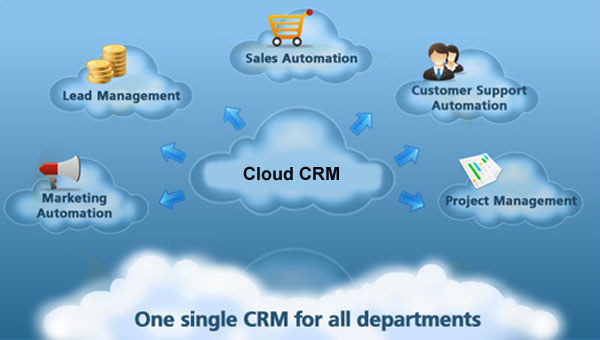"Rev Up Your Sales Game: Unlocking the Benefits of Cloud-Based CRM"
"Rev Up Your Sales Game: Unlocking the Benefits of Cloud-Based CRM"

"Rev Up Your Sales Game: Unlocking the Benefits of Cloud-Based CRM"
Are you tired of managing your customer relationships with spreadsheets and sticky notes? Do you dream of having a single platform that lets you track every interaction, from lead to close? Look no further than cloud-based Customer Relationship Management (CRM) software. In this article, we’ll break down the benefits of cloud-based CRM and how it can revolutionize the way you do business.
What is Cloud-Based CRM?
Before we dive into the benefits, let’s define what cloud-based CRM is. Simply put, it’s a software platform that lives in the cloud (i.e., online) and helps you manage all aspects of your customer relationships. It’s like having a super-powered Rolodex that lets you track every interaction, from emails and phone calls to social media conversations and sales meetings.
The Benefits of Cloud-Based CRM
So, what makes cloud-based CRM the bee’s knees? Here are just a few of the benefits:
- Accessibility: With cloud-based CRM, you can access your customer data from anywhere, at any time. Whether you’re working from the office, a coffee shop, or on the road, you can stay on top of your relationships.
- Scalability: Cloud-based CRM grows with your business. Whether you’re a solo entrepreneur or a large corporation, you can easily add or remove users and features as needed.
- Cost-Effective: Say goodbye to expensive hardware and software upgrades. Cloud-based CRM is typically subscription-based, which means you only pay for what you use.
- Automated Tasks: Cloud-based CRM automates many routine tasks, such as lead scoring, follow-up emails, and data entry. This frees up more time for what really matters – closing deals.
- Real-Time Analytics: With cloud-based CRM, you can get real-time insights into your sales pipeline, customer behavior, and marketing performance. This helps you make data-driven decisions and stay ahead of the competition.
- Collaboration: Cloud-based CRM makes it easy for teams to collaborate and share information. This ensures that everyone is on the same page and working towards the same goals.
- Security: Reputable cloud-based CRM providers have top-notch security measures in place, such as encryption and backups. This protects your data and gives you peace of mind.
- Integration: Cloud-based CRM often integrates with other tools and apps you already use, such as email marketing software, social media, and accounting systems.
- Mobility: With cloud-based CRM, you can access your customer data on the go, using your smartphone or tablet. This keeps you productive and connected, even when you’re away from the office.
- Customization: Cloud-based CRM offers a range of customization options, so you can tailor the platform to your specific needs and workflow.

How Cloud-Based CRM Can Help Your Business
Still not convinced? Here are just a few examples of how cloud-based CRM can help your business:
- Improve Sales Performance: Cloud-based CRM helps you track every interaction and conversation with your customers. This gives you valuable insights into their needs and pain points, so you can close deals faster.
- Enhance Customer Experience: With cloud-based CRM, you can create personalized experiences for your customers, tailored to their interests and preferences. This builds loyalty and trust.
- Streamline Operations: Cloud-based CRM automates routine tasks and streamlines your workflow. This saves you time and reduces the risk of human error.
- Gain Competitive Advantage: Cloud-based CRM gives you real-time insights into your competitors and market trends. This helps you stay ahead of the competition and make informed decisions.
Real-Life Examples
Here are just a few real-life examples of businesses that have benefited from cloud-based CRM:
- Small Business: Emily, the owner of a small retail store, uses cloud-based CRM to track customer interactions and loyalty points. This helps her create targeted marketing campaigns and offer rewards to her loyal customers.
- Enterprise: Mark, a sales manager at a large corporation, uses cloud-based CRM to manage his team’s sales pipeline. This gives him real-time insights into their performance and helps him make data-driven decisions.
Getting Started with Cloud-Based CRM
If you’re ready to take the leap, here are a few steps to get started with cloud-based CRM:
- Research: Look for reputable cloud-based CRM providers that offer the features you need. Some popular options include Salesforce, HubSpot, and Zoho.
- Try Before You Buy: Take advantage of free trials or demos to test out different platforms.
- Customize: Tailor the platform to your specific needs and workflow.
- Train Your Team: Make sure everyone knows how to use the platform and is on board with the new process.
Conclusion
Cloud-based CRM is no longer just a "nice to have" – it’s a must-have for businesses that want to stay competitive and thrive. With its accessibility, scalability, and real-time analytics, cloud-based CRM can revolutionize the way you do business. Whether you’re a solo entrepreneur or a large corporation, cloud-based CRM can help you close more deals, improve customer experience, and gain a competitive advantage.
